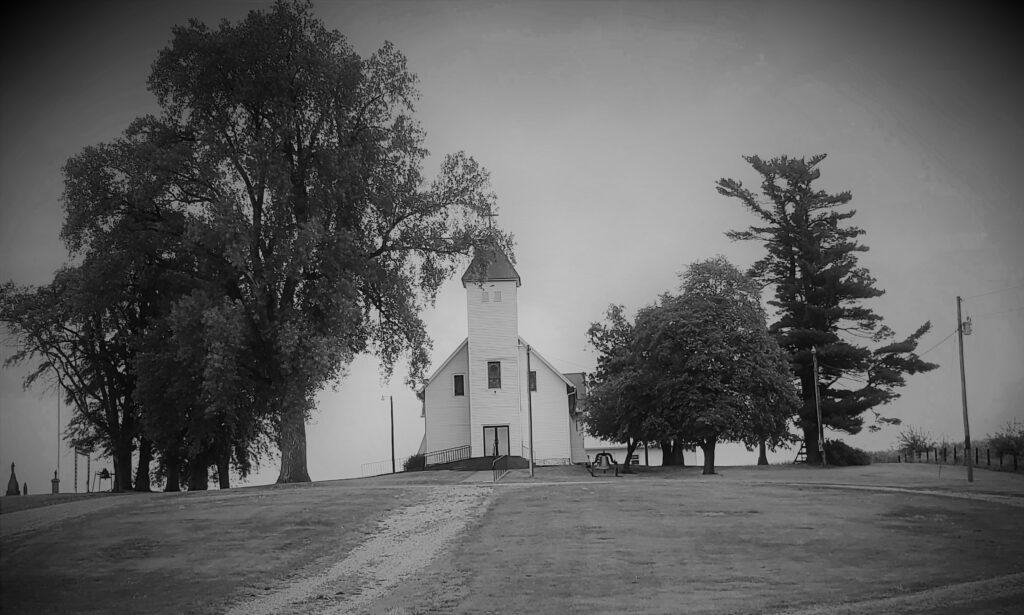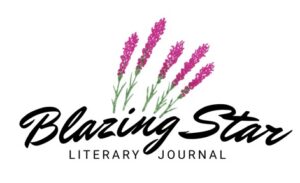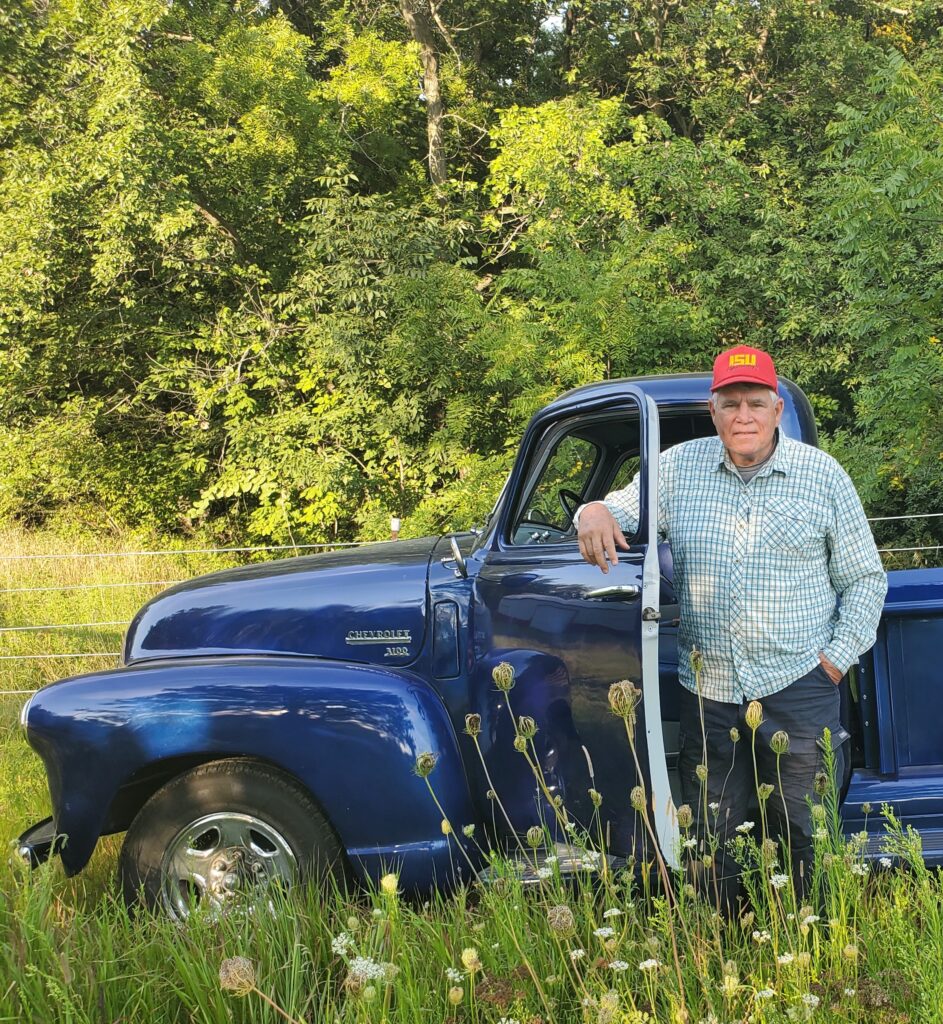from “‘Hell Yes’ and ‘Heavens No’ – The Story of a 1950s Farm Boy”
A Memoir by Russ Mullen
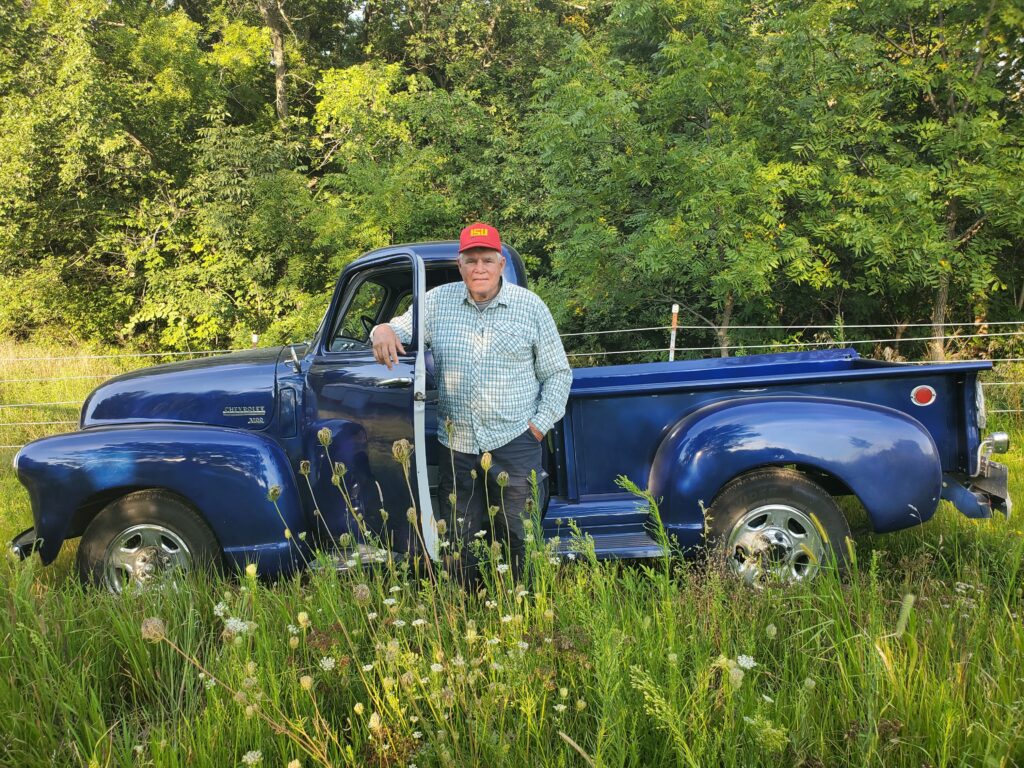 Read Part 1 here
Read Part 1 here
Part 2
Herd them, chase them, cuss them.
Keep those cows a-goin’.
Don’t let them calves be laggin’,
let Poncho do the crowdin’.
And when we finish drivin’,
the night will find us smilin’.
We passed Mom on the hill with smiles and thumbs-up hand signals. She turned the car around and followed us with a carload of food to feed us under the October sun. Each of us took turns guessing what goodies were in Mom’s cattle-drive lunch – an exercise that only made us hungrier. We kept turning around to reassure ourselves that Mom did not abandon our troupe. The worst was behind us now – except for Jeff in his red boots and his second encounter with Vaca Loca a half mile over the next hill.
Dad dropped Eldon off at the first roadside gate to guard it and then dropped Jeff off at the next one. Roadside gates spanned field-entry driveways and typically were three rusty horizontal barbwires separated and fastened by baling wire to three vertical, partially rotted tree limbs. The limbs at the ends were wired to the corner fence posts with heavier No. 9 wire. These flimsy barriers were more for show than functionality. A determined cow or calf could jump or push under most of them, but they were easy and cheap to build with the typical materials at hand. 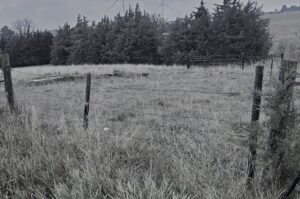
Every cattle farmer had three main types of wire on the farm: barbed wire, baling wire, and No. 9 wire. Barbed wire comes in 80 rod rolls (1320 feet) and consists of two strong, 12.5-gauge wires twisted around small barbs at five-inch intervals. Barbed wire has been a main component of fencing since its inception over 150 years ago by Joseph Glidden, a DeKalb, Illinois farmer. Baling wire is a light 14.5-gauge, pliable wire and named for its popularity in binding hay and straw bales since the late 1800s. Baling wire was gradually replaced by twine for wrapping bales in the 1960s and 1970s. Baling wire can be easily bent, twisted and cut by hand pliers. It is widely used on farms for binding or repairing everything from ‘soup to nuts’. Farmers used baling wire to repair fences, hold barn doors shut, hold chicken roosts up to clean out chicken manure, secure water pipes from the cattle tank to the cistern pump of a windmill, and attach loose mufflers to car frames. No. 9 wire is nine-gauge and thicker and stronger than baling wire. No. 9 wire is used for securing gates, corrals, panels, boards, or other objects that need strength to withstand pressure from large farm animals, machinery, or weighted objects.
The gate Eldon guarded was flimsy but wired shut so it provided a good deterrent. The herd passed him without incident except for Vaca Loca. She lowered her head and faked a four-step-charge at him when she passed. Nothing serious — just to make a point that she didn’t like him. But the message was clear. Eldon decided that a six-foot-long and four-inch-thick tree limb lying on the ground would make a nice walking stick in case Vaca Loca wanted to get ‘close and personal’ in the future.
We moved the herd past Eldon, who joined us in driving them on the road to the next field gate. Jeff guarded that one. The gate didn’t reach across the entire length of the entry, so Jeff stood in the middle of the open space to dissuade cattle from entering. This worked like a charm for all cattle and calves, except Vaca Loca.
Eldon, worried about Jeff, bypassed the herd by running ahead in the road ditch to join him. When he got there, Vaca Loca was in a staredown with Jeff, ignoring his waving arms and yelling. Vaca Loca’s four legs were evenly balanced, locked and loaded for action, her head lowered and centered on Jeff’s red boots. She didn’t see Eldon approaching from the side and didn’t hear his shouts. The only thing Vaca Loca heard was the internal command to charge. She bolted out of her stance like someone poked her behind and snorted some derogatory label and cuss word at Jeff in cattle language. Jeff easily translated and backpedaled, scared to turn his back to the charging cow. She bore down on him and closed fast. He stumbled on a rock, lost his balance and fell on his back. He raised his boots to absorb the impact of the head butt and to use her head as a momentary brace to pivot his body away from trampling legs. It was a fortunate decision. Vaca Loca stopped her charge just as his boots touched her forehead. She focused and butted them several times, ignoring Eldon’s approach from the side.
“Jeff, lower your boots on the ground so I can hit the cow on its head with my stick,” Eldon yelled.
The cow turned toward Eldon. He took a batter’s step and started his swing, hips rotating the big limb toward Vaca Loca’s head. The limb gained speed and leveled out at the cow’s forehead. Boom! It was a home run swing to center field. The cow stopped, shook its head and came out of its trance. The crazed look disappeared on her face. She turned around and ran back to the herd, looking normal from a rear-end perspective. Jeff experienced the whole thing reclined in his VIP seat behind home plate – the pitch, the rush of air from the batter’s swing, the crack of the bat and the roar of adulation from the crowd. With his big bat resting in his left hand, the hero stood over him, smiled and pulled up the awestruck fan with his right.
“Wow, Uncle Eldon, I’m sure glad you came and had that big stick with you. I thought I was a goner. That was a great hit,” Jeff said, looking up at him with relief and eyes returning to normal proportions.
“That cow must like your red boots, Jeff,” he said, smiling. “Looks like you peed your pants a little.”
He looked down at his pants, embarrassed, but couldn’t see any wetness.
“Just kidding you, Jeff. You were a brave young man.”
“Do you know that in Spanish bullfights, the matador waves a red cape to incite the bull to charge?” Eldon asked.
Jeff listened. It was the last time in his life that he ever wore red during a cattle drive.
The rest of us drove the herd past Eldon and Jeff, unaware of the drama that just occurred. We soon passed Steve, who guarded another gate. All of us were concentrating on thoughts of lunch. I wondered why Eldon was walking with such a heavy walking stick and predicted that he would discard it before or after we ate. Hours later, I was glad he was still devoted to that big walking stick.
We drove the cattle to the designated lunch spot, glad to be in the rear with immediate access to Mom and lunch. Dad was at the front blocking the herd with his pickup and feeding corn to settle them.
“I need a couple of volunteers to come here and watch the cows while I eat lunch,” Dad hollered over the mooing cows.
“Can’t hear you, Dad,” I said.
He repeated his request, louder this time.
“We hear you, Dad, but no one volunteered. They are all busy helping Mom. Besides, we don’t want to scare the cows by walking through them. Don’t worry, we will leave you some food to eat after we are finished,” I said, sitting on Poncho and smiling.
Mom parked the car, opened the doors and divided the eager workforce. Older siblings set food on the country table and younger ones handed out dishes, plates, drinks, and silverware. In minutes, the big, sun-faded gray and rusted hood of the Buick Electra car was covered in lunch items. The hood was warm from the engine heat and the October sun. Steam rose from dishes of food emitting tantalizing aromas that raided our noses, mouths, minds, and stomachs. Forty-eight warm, homemade buns with melted butter were wrapped in tinfoil. New jars of homemade strawberry jelly and creamy peanut butter sat next to the bread. Thick slabs of ham and turkey peeked out from covered cake pans. Mashed potatoes, whipped with cream, milk and butter, sat in a two-gallon, double-handled pot. Creamed string beans, with crisp onion slices on top, filled another two-gallon pot. Two large pans of jello salad sat next to the beans – one orange with banana slices and the other red with fruit cocktail. One bag of Red Delicious apples and one bag of Florida oranges sat next to the jello. Desserts sat in four pans that rested at a slant on the front windshield — chocolate brownies! Two brownie pans had caramel drizzled on top like brown mud flows across black, rich soil. The other two brownie pans were covered in thick, white frosting swirled in rippling snow drifts. All pans were cut into 24 pieces. We drank lemonade from a five-gallon jug and water from three two-gallon milk jugs. Mom brought two canning jars full of hot coffee for Dad and Eldon.
The older siblings helped the younger ones fill their plates and seated them on the road leaning against the car. The older siblings sat and ate on the roadside with legs resting downward on the road bank. It was a vacation spot for us in a valley between two forested hills in Cass County. We were in a brightly lit ballroom with lazy white clouds painted on the ceiling. The temperature was perfect. Cows provided instrumental music during the meal. I peeked at Mom. She wasn’t eating yet and seemed content to supervise. Her face glowed and radiated warmth, love and pride. She had prepared a five-star country meal and knew it. Her image reinforced a family message that a job worth doing is worth doing well. I decided at that moment to hug and thank her after eating – plus it might help keep those meals coming in the future!
Not much was discussed during the first round of eating. Conversation, joking and elaborating on the morning’s events dominated the second round. Every time someone stood up to get more food, someone else requested a food item. Mom wanted to hear all the stories. She expressed concern for several stories and warned us to be careful. We scooted back into the road ditch after eating and leaned against the bank. With our bellies full and the sun’s warmth on our faces, it didn’t take long to ride the puffy clouds with our dreams.
“I’m hungry,” Dad’s voice drifted over the mooing cows and awakened us from our food stupor.
Eldon, Steve, and Jeff walked through the herd to take over for Dad.
“Don’t wait for me. Get the herd moving and I’ll catch up to you after eating,” Dad yelled at us.
I unhitched Poncho from the neighbor’s fence, led him to the road and settled into a sun-warmed saddle. Living in the moment, not a worry on my mind and my belly full, I whistled the command to restart the cattle drive. Reenergized and eager to finish the day’s task, we began marching and yelling our own unique cow commands: hip-hip, giddy-up, move along, hee-ya, a variety of whistles, shrieks, nonsensical words and animal sounds like barks, hisses and growls. Occasionally one of us would create a catchy word or phrase that everyone would mimic for several miles until we favored a new expression. I tipped my hat downward to block the sun’s glare, focused on the herd ahead, and whispered the words, ”Herd them , chase them, cuss them. Keep those cows a-goin’…”
Five miles later, we were a practiced road band with a dichotomy of sounds, instruments and a choreographed march that seemed to find a country rhythm and beat. But little did we know that ahead, the neighbor and his dog would not be appreciative fans of our country band.
We drove cattle uphill, downhill, over flat valleys and level ridge tops. Our family of ten participated in an agricultural tradition that was thousands of years old. Cattle, a generic term for both beef and milk cows, is an animal tool for turning grass into protein and milk sources for human diets. Cattle was a tamer replacement for bison and fueled the westward expansion of the U.S. Beef cattle were genetically selected for meat production and milk cows primarily for milk production. Bulls are the breeding males, steers are the castrated males, cows are the female cattle, calves are the youngsters and yearlings are the teenagers. Our beef herd contained all the types and extended over a quarter mile.
The younger, eager cows and their calves led the way and older cows struggled to keep up. And constantly, stubborn cows and calves veered into the road ditch eating fresh grass, content to let the herd move on without them. All of us practiced our throwing skills. A well-thrown chunk of gravel rock would often get cows going but sometimes the driver had to walk into the road ditch to move them. Patience and soft words of encouragement to stray cows and calves disappeared after about 10 of these events. Even the younger siblings started yelling and cussing like old cowboys when Mom wasn’t nearby. They began complaining of tired legs and feet and riding Poncho became a highly sought-after remedy. I held the power to choose who, when and how long each person could ride. This was an opportunity to bridge the teachings of Mom and religion and Dad and economics. I practiced ‘corporal works of mercy,’ a Catholic term for practices that help meet material and physical needs of others, toward my younger brother and sisters by giving them rides on Poncho. And, before the day was done, a month’s worth of feet and back rubs were bartered for me. I felt saintly. What a great way to practice religion on the Mullen Cattle Drive!
We developed a practiced game of leapfrog. Dad or Uncle Eldon would let the cattle pass them in their vehicle, pick up the chosen walkers and drive them through the herd to guard roadside gates ahead. The process worked well until we approached a neighbor’s farmstead with no fences to protect the expansive yard.
“Russ, stay behind with Poncho. I need everyone else to come with me to keep cattle from entering the neighbor’s yard on the next hill. Russ, move the ‘tail enders’ faster and tighten the herd before we reach his place, ” Dad ordered. “Frank is a cranky SOB and doesn’t like cattle tracks in his yard. Hopefully, that damn dog of his is locked up.”
I busily weaved Poncho on the road and into the ditches. Fall ditch grass, ragweeds, milkweeds, curly dock, sweetclover and other plants held a summer’s load of road dust. The legs of cattle and Poncho stirred up little clouds walking among them. Our eyes itched, we sneezed, and the black streaks on my wrinkled handkerchief told me we were being stalked by a small, but harassing, dust storm. Concentrating on hurrying up the slower cows, I didn’t realize how close we were to the farmstead. Looking up, my siblings were stretched out along the neighbor’s yard with no sign of the neighbor. Hopefully, he wasn’t home but that was unlikely since his pickup was parked by the garage. A big cloud cast a moving, foreboding shadow across the farmstead when the dog appeared. A big German Shepherd, belly-crawling in high weeds on the western edge of the yard fence. His ears were laid back with an evil grin on his face. Things were going to get interesting fast!
“THHUUURREEEK,” I whistled at him. “Get out of here.”
The dog from hell ignored me and fixated on an unsuspecting calf nearby. His growl preceded his charge, loud enough for the mother cow and others to run to the rescue. The devil dog stopped, let the calf and cows pass him, and chased them into a full gallop toward unsuspecting siblings standing in the neighbor’s yard. My siblings were no match for the onrushing herd and ran to safety behind trees, buildings and tractors parked nearby. Soon, cows were milling and bawling all over the manicured lawn. I tried to round them up and turn them back to the road but the devil dog chased them south and east. The frenzied herd mashed a fence and stampeded into another neighbor’s 160-acre pasture and disappeared over the horizon. I overheard the neighbor chastising my father about his cows and paying for lawn damage when Poncho and I returned to the road.
“You’ll have to pay for damage to my lawn,” he demanded.
“Like hell I will,” Dad retorted. “Your damn dog caused the herd to bolt and now they are spread to ‘kingdom come’. You saw us coming and you could have locked up your dog.”
“My dog is my business, not yours. He was protecting his property,” the neighbor yelled. “Maybe I need a rifle to keep your cows off my land.”
“The next time we move cattle past your property and your dog chases my cows, you will see it lying dead on your front doorstep,” Dad promised.
Years later I studied the art and guidelines of negotiation and conflict resolution and recalled that Dad’s exchange with the neighbor broke every rule. Yet we never had a problem with that neighbor in future cattle drives. He even helped us, sans the devil dog.
Now, late in the afternoon, it would be dark by the time we rounded up the cattle, crossed the highway, and finished the drive. Dad told us to wait while he talked with the owner of the pasture where the cows had scattered. He returned 20 minutes later with permission to leave the cows overnight. Dad approached Mom and leaned down. She squared her legs and looked upward. From my distance, it looked like a debate rather than a discussion. I overheard parts of their conversation and smiled, knowing Dad already lost the battle.
“If we can finish the drive by noon tomorrow, then we can move hay and grind corn in the afternoon while the boys are here. Monday, they’re in school,” Dad countered.
“No, we are not going to skip Sunday Mass in order to finish the cattle drive in the morning,” Mom stated. “Remember our little agreement…Sunday morning is for God and the afternoon is for you. And you don’t get precedence over God.”
Even though Dad assured Mom that all of us were saved and on a heavenly track, he decided to resume the cattle drive tomorrow after church. We arrived home disappointed, the silence of defeat in our midst during evening chores and supper. Mom thought a few prayers during Mass might be a good idea to help finish the drive without further problems. But some of us found out that prayers weren’t enough to exorcise the demon in Vaca Loca.
6 a.m. Sunday Morning.
“Breakfast, everybody up, last one downstairs washes dishes,” yelled Mom. She straightened the front of her white apron embroidered with hand-stitched yellow flowers and dried her hands with an up-down motion on the sides. “We have to get ready for church.”
Her warning was the snooze button on the alarm. Beds didn’t creak, feet didn’t move, and early morning nightmares of Vaca Loca continued.
“BREAKFAST, GET YOUR BUTTS DOWN HERE…NOW!”
Dad’s deep, menacing voice raced upstairs, slammed against walls, bounced off ceilings and hit us square in the face. Nightmares of Vaca Loca instantly vanished, replaced by the fear of heavy footsteps coming from a big, burly man who wasn’t bound by the fifth commandment, “Thou shalt not kill.”
The quick and efficient pre-Mass breakfast was ready. Ten steaming bowls of oatmeal waited for us on the cracked and faded oilcloth covering the big, walnut dining room table, maxed out in length with one-foot wide leaves. An open oven door exposed a rack full of toast. Butter and a quart canning jar of elderberry jelly sat on the table next to two empty bread-loaf bags.
“No eating after 7 a.m. so the older ones can receive Communion,” Mom warned. “Sharon and Mary Jo, help Barb, Patty and Danny take a bath and get their Sunday clothes on. They need to be out of the bathroom by the time Russ, Steve and Jeff get back from chores so they can clean up for church.”
After a quick breakfast, the older sons rushed outside to do chores. I grabbed the three-gallon milk pail hanging from a 40-penny nail driven at a 45-degree angle into the porch wall, headed to the barn, and milked two cows. Steve fed corn to the hogs and Jeff fed the chickens. Returning to the kitchen, I strained the fresh milk through a cloth diaper into a large pan, removing hair, dirt and unidentifiable {but guessable} chunks of dark matter. I repeated the process after rinsing out the diaper. The milk was placed in the refrigerator to cool and to allow the cream to rise to the top. It would be skimmed off with a saucer and spoon before drinking the next day.
Steve, Jeff and I scooped ear corn into the pickup bed from the round, slatted corn crib. Dad would feed corn to the steers in the barn lot while we were at church and use the rest to entice the cows out of the neighbor’s field when we restarted the cattle drive. Jeff left before we finished scooping corn to take a quick bath. Steve left 10 minutes later to take his bath, using Jeff’s bathwater. I had taken a bath the night before and planned on 15 minutes to scrub the cow and milk smell off me, wet and comb my hair, and put on my Sunday clothes. Picking out a Sunday outfit didn’t worry me because I was an altar boy for today’s Mass and would be covered by a robe.
“I’m leaving now,” shouted Mom. “If you get left behind and miss Mass, it will be a mortal sin and you know what happens to your soul if you die with a mortal sin!”
“What about Dad?” asked Mary Jo. “He doesn’t even go to church!”
“Just pray today that he doesn’t die so that he won’t go to hell,” Mom said, loud enough for Dad to hear.
Dad lowered The Des Moines Sunday Register paper and replied, “Get saved this morning and get back here as fast as you can so we can get those cows home.”
Mom marched out the porch screen door carrying Patty, Sharon marched out carrying Barb, followed by Mary Jo, Danny, Steve and Jeff, with me bringing up the rear. All of us piled into the big Buick, four in the front seat, five in the back, some standing, most sitting, and none wearing a seat belt. We had a big job ahead of us at church — praying for Dad’s lost soul and for a smooth finish of the cattle drive.
The priest’s homily focused on treating others like you wanted to be treated and to trust the good in the world. We had an interesting discussion on the way home from church. How do we treat Vaca Loca today? Do we forgive her sins and trust the good in her?
“All of you can but I’m not going to and I’m not going to wear anything that’s red,” Jeff declared.
“Jeff, did you listen to the priest today about forgiving and forgetting offenses and trusting in the good of people and things?” Sharon asked.
“Yes,” said Jeff. “But I was face-to-face with Vaca Loca yesterday and I didn’t see any good in her so I’m not going to trust her today. Sharon, if you trust Vaca Loca, wear red today and let’s see your faith in action.”
We all laughed when Sharon said that she didn’t have any red work clothes.
Three miles from home we approached the notorious half-mile hill that led to the intersection where we took the south road to our place. We started badgering Mom about how slow she drives.
“Come on, Mom, drive faster.”
“You’re a slowpoke.”
“Dad’s waiting on us.”
“Bet you never drove faster than 50 mph in your life,” we needled her.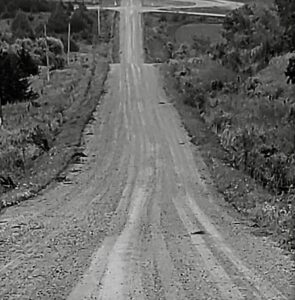
Barb fell back into Steve’s lap when the big Buick roared to freedom, down the hill faster and faster. I was in the front seat and looked at the accelerator. It was pushed flat against the floorboard, no wiggling, no wavering, just a small, black short-heeled dress shoe that couldn’t possibly be part of our sweet, cautious, church-loving Mom. Fifty-five, sixty, sixty-five, seventy, seventy-five – all joking and comments ceased. Ten hands gripped the front car seat and 16 eyes stared at the windshield. When the speedometer reached 80, the only sounds were the roaring motor and gravel pinging the car.
“Better slow down, Mom.”
“I’m scared.”
“Mom, slow down, or you’re going to get us all killed,” we started shouting.
Mom braked hard to make the corner, resumed her cautious gravel road speed, and calmly turned to us and said that she didn’t want to hear any more comments about a slow driver. But I saw her from my front row, passenger seat – a young Patricia Waters. Her scarf barely holding on to flying hair, dark eyes flaming, nostrils flaring over a jaw set in firm determination. She was flushed with excitement, spirited, reckless. A young, Catholic woman throwing caution to the wind and arguing with her parents that she was going to marry that rough heathen, nicknamed ‘Moon Mullen.’ I smiled knowing that this momentary glimpse into her youth was the reason we were all here in this car.
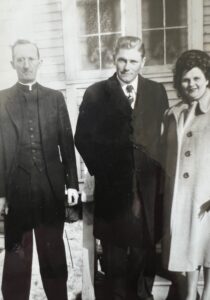 Steve asked if we all trusted the good in Mom during the last half mile. We all had our doubts for the rest of the way home. When we pulled into the driveway, Danny ran to Dad. Danny’s sandy, sun-bleached hair, cut in a butch style, made him look bald from a distance. Hence Dad nicknamed him ‘Baldy,’ a family nickname that stuck with him into adulthood.
Steve asked if we all trusted the good in Mom during the last half mile. We all had our doubts for the rest of the way home. When we pulled into the driveway, Danny ran to Dad. Danny’s sandy, sun-bleached hair, cut in a butch style, made him look bald from a distance. Hence Dad nicknamed him ‘Baldy,’ a family nickname that stuck with him into adulthood.
“Dad, we got saved from Mom today at church!” Baldy shouted.
Dad glanced at Mom with eyebrows raised. Mom was herding her flock out of the car toward the house in an unsynchronized parade march that only 18 legs — ranging from one to three feet long — could muster. There wasn’t a song in the world that could harmonize this march. She returned his look with an all-business glare.
“If you want to help me change the kids’ clothes, clean the house and peel potatoes for lunch, I will tell you all about it.”
Dad’s curiosity ended quicker than a water droplet on a hot frying pan.
It was almost 1 p.m. when lunch was finished, Dad woke from his nap and came outside. He motioned us to come to him. My brothers and I were in the feedlot. I was throwing broken corn cobs to them for batting practice, wishing I had a brother closer to my age to throw cobs to me. Breaking corn cobs into thirds strengthened my hands and wrists. One could really throw drops, sliders, and curves with fresh corn cobs. The clean, reddish colored cobs, full of empty hulls, had great wind resistance for throwing breaking pitches. I used old, dark-colored cobs packed with soil and manure to throw straight fastballs.
“Russ, saddle up Poncho and load him up in the pickup trailer. We will need him to round up the cattle at the neighbor’s field and get them on the road again,” Dad ordered.
Reversing Dad’s arguments from yesterday morning, I said, “We really don’t have time to mess with Poncho. We have plenty of walkers. We need to get going.”
Dad looked at me with a menacing scowl and said, “No bullshit…get it done.”
I knew his scowl was forced, it was a gut feeling and I was getting good at reading body language. The softened eyes, relaxed jaw, and maybe a hint of a grin reassured me. Working with a 6’1”, 270 lb. dictator, who could easily break your bones, satisfied my personal incentive to learn body language. My insistence on taking Poncho the day before was vindicated and it felt good to be right, and alive.
Dad and my uncle, Eldon, drove us to the 160-acre pasture where the cows broke through the fence and overnighted after being chased by the neighbor’s devil dog. A 160-acre pasture is a quarter section and often a half-mile long square. But this pasture wasn’t square. It was a rectangle, a quarter-mile wide at the road and one-mile deep. No cows were in sight. Dad backed the pickup into a steep road ditch so that I could walk Poncho out of the stock trailer onto the road. We heard that devil dog barking somewhere in the distance and hoped that he was locked up. Starting today’s cattle drive by shooting the neighbor’s dog didn’t seem like the proper way to embody this morning’s sermon.
I led Poncho through the field gate into the unknown – a field that disappeared over the first rise about 300 yards from where we stood. The wind was at my back, blowing pasture grass into waves that disappeared over the imaginary waterfall at the crest of the hill. With my left shoe in the stirrup, two hands gripping the saddle horn and a right-foot hop, I swung my right leg over the saddle and immediately felt the effects of yesterday’s cowboy career. I wondered how many cattle drives were needed to permanently walk bowlegged. I stood up and sat down on the saddle several times to limber up and stretch the rubber bands inside my hamstrings and derriere. Muscles released and now relaxed, and the devil dog nowhere in sight, I rode toward the ridge, wondering what it was like on the other side. My attempts to enlist today’s support from Mary, Mother of Jesus, by creating a tune out of the Hail Mary prayer was a dismal failure. But the attempt and the crisp, clean air of the moment, led me into singing the Beach Boys song, Good Vibrations. Yes, today was going to be a good finish to our cattle drive. Little did I know that before we finished the day, it would be Vaca Loca that would be giving me excitations.
Poncho and I drove the cattle to the road without major problems. They acted like hardened, horse-driven animals. Dad spread corn on the road, the family encircled the herd while Poncho and I drove them though the gate. All came out without a hitch. I was definitely getting good vibrations. We had six miles to reach the finish line. Two miles later, we stopped traffic on the only highway crossing required before reaching home. Two teams of two sisters and two brothers waved traffic to a stop about a quarter-mile before each end of the intersection. When the last cow-calf crossed the highway, we had 12 cars, pickups and trucks waiting to resume their journey. They waved and smiled at us, some giving us the ‘thumbs up’ sign. Two got out of the vehicles and helped us keep the herd from straying off the roadway.
The cattle suddenly stopped on the road 30 minutes after the highway crossing, The rear of the herd bumped into the ones in front, and then milled around and tried to turn back on us. I drove Poncho through the crowd and saw the problem. An eight-foot bullsnake was spread on the road, hissing its displeasure toward the cows. Poncho shied backwards too. I hollered at Uncle Eldon and he brought his big tree limb and nudged the snake into the road ditch. The herd, even Poncho, passed on the opposite side, acting like the snake was still on the road. We found the snake, partially camouflaged in roadside grass. It looked like the cunning tree serpent depicted in our church that tricked Adam and Eve in the Garden of Eden, jump-starting the world’s clothing and fashion industry. Mary Jo wondered if it was a relative of the giant, tropical snakes in Tarzan movies.
About three miles from home, a calf was standing under the branch of a red oak tree overhanging the road ditch. No amount of encouragement, cussing and rock throwing seemed to motivate him to move.
“Steve, walk down the bank and get him moving with the rest of the herd,” I ordered.
Steve slipped and slid down the grass-covered road bank and raised his walking stick to poke the calf’s butt. At the same time, the calf flicked its ears and bolted out from the shade like he was shot from a cannon. Steve yelled and batted his ears. His stick flew up, slicing the air like a medieval sword fighting an imaginary invader. His hat was in his right hand, swinging back and forth, seemingly to taunt the invisible foe. Steve climbed back up to the road after 20 yards of backpedaling and dueling. Five of us stared at him with the unspoken question.
“There was a hornet’s nest somewhere in the branch of the tree and one got me just behind the ear,” Steve said.
Immediately, five family doctors examined the swollen ear lobe and all had the same prognosis.
“Yep, it’s a sting all right. You’ll be fine once your ear stops hurting,” we assured him.
We continued, ready to end the cattle drive in the remaining few miles. I let Steve ride the horse so he could forget about the hornet. But overhanging branches along the road took on a new, ominous threat to us.
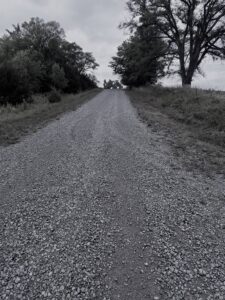 The last half mile of road had two steep hills to climb. The first hill slowed the herd to an unhurried walk. The downhill stretch required us to jog to keep up. But the last hill tired everyone out. I was walking without a stick, my back leaning forward, hands pushing off my thighs to give me an extra boost, my head down and my eyes focused on the gravel passing beneath my feet. The only sound that brought me out of my walking trance was a short grump and a “you son of a bitch.”
The last half mile of road had two steep hills to climb. The first hill slowed the herd to an unhurried walk. The downhill stretch required us to jog to keep up. But the last hill tired everyone out. I was walking without a stick, my back leaning forward, hands pushing off my thighs to give me an extra boost, my head down and my eyes focused on the gravel passing beneath my feet. The only sound that brought me out of my walking trance was a short grump and a “you son of a bitch.”
I looked up to see Vaca Loca charging down the hill straight toward Uncle Eldon and me. Eldon, in front of me, dodged to the left, planted his feet and slowly started swinging his big tree limb toward the lowered forehead of the charging cow. At this point I became the target, a matador with no sword and no red flag to distract and pivot away from the charging beast. I could only hope that Eldon could get the tree limb around fast enough to hit the cow before she got past him. Somehow, he did. It was another homerun hit. Vaca Loca, legs locked and snot blowing out her nose, slid to a stop six feet in front of me, turned around, and ran back to the herd. I witnessed a small miracle and Eldon was my saint. The 30-second event reenergized my tired body, and kept me walking straight, with my head held high, for the rest of the way.
We arrived home and the cattle ran into the waiting pasture like kids piling out of a car to their favorite campground. We felt the same way. The Great Mullen Cattle Drive was over for the year. Sore feet, tired muscles, thirsty lips and grumbling stomachs made us look forward to finishing our evening chores and capturing the aromas of food emanating from Mom’s kitchen.
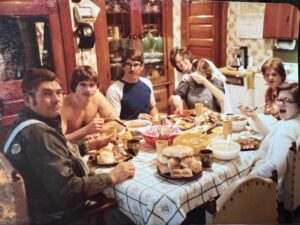 Evening chores went well – everyone was practiced in their own chore responsibilities. There was just one little event that was exciting for Steve, Jeff and me. Steve was feeding the penned-up boar under the shade of our big white oak tree. Jeff was nearby watching him. I picked up a nodding, fuzzy seed head of giant foxtail and winked at Jeff. He caught on immediately. We silently approached behind Steve. I touched his ear lobe, ever so slightly, and whispered a deep, throaty, “Bzzzz.”
Evening chores went well – everyone was practiced in their own chore responsibilities. There was just one little event that was exciting for Steve, Jeff and me. Steve was feeding the penned-up boar under the shade of our big white oak tree. Jeff was nearby watching him. I picked up a nodding, fuzzy seed head of giant foxtail and winked at Jeff. He caught on immediately. We silently approached behind Steve. I touched his ear lobe, ever so slightly, and whispered a deep, throaty, “Bzzzz.”
Steve dropped the feed bucket, backing and turning around at the same time. He had his hat in hand and was furiously swinging at the air. I immediately looked upward, swatting at nonexistent dive bombers. He turned toward Jeff, who was swatting at imaginary hornets and backing up. We watched Steve as he ran away from us, swatting furiously.
“Did you get stung again, Steve?” we yelled.
“No, did you?” Steve yelled back.
“I knocked several down with my hat,” Jeff replied.
“One landed on my arm, but I got him before he stung me,” I stated. “Go on to the house, Steve. I’ll finish feeding the boar for you.”
“Gee thanks, Russ.”
“Hey, that’s what brothers do.”
Copyright © 2022 by Russ Mullen
Russ Mullen
Russ Mullen is Professor Emeritus of Agronomy, Iowa State University. He was a scientist and educator during his 41-year university career. He taught crop science and authored numerous articles in scientific journals, abstracts, and proceedings, and semi-technical articles on crop and seed production, crop quality, and agronomic education. His textbook, Systems – Food, Fuel, Feed, Fiber – Fifth Edition, Kendall Hunt was adopted by many agricultural-based universities and community colleges in the U.S. His greatest enjoyment at the university came from working with students and the freedom to pursue teaching and research innovation.
The author grew up during the 1950s, 60s and 70s, in a family of 10 with a devout Catholic mother and an agnostic father, on a diversified farm in southwest Iowa. It was an environment that nourished his love of agriculture, outdoors, stewardship of natural resources, and innovative problem-solving approaches – experiences that directly influenced his life as a university scientist. He owns a 120-acre farm inherited from his parents. He believes good stewards of farmland manage and safeguard agricultural landscapes to provide biological diversity and healthier ecosystems. He enjoys creative endeavors and inventing weird metal things in his shop.
This chapter highlights his family’s efforts in driving cattle for 12 miles on gravel and dirt roads during the 1950s and 1960s. Neighbors and family dubbed it The Great Mullen Cattle Drive – a cattle drive now extinct in the Midwest because most roadside fences have disappeared. It’s a story of a farm family working together to meet challenges, solving problems, sharing laughs, and building memories.
